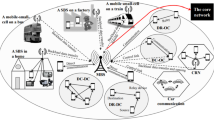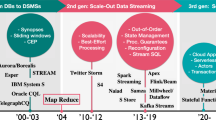Abstract
As RFID installations become larger and more geographically distributed, their scalability becomes a concern. Currently, most RFID processing occurs in a central location, gathering tag scans and matching them to event-condition-action (ECA) rules. However, as the number of scans and ECA rules grows, the workload quickly outpaces the capacity of a centralized processing server. In this paper, we consider the problem of distributing the RFID processing workload across multiple nodes in the system. We describe the problem, and present an overview of our approach. We then formulate two decision models for distributing the processing across the system. One generates an optimal allocation based on global awareness of the state of the system. This problem is \(\mathcal{NP}\)-hard and assumes that bandwidth and processing resource availability is known in a central location, which is unrealistic in real scenarios. Thus, we use this model as a theoretical optimal model for comparison purposes. The second model generates a set of local decisions based on locally-available processing and bandwidth information, which takes much less information into account than the global model, but still produces useful results. We describe our system architecture, and present a set of experimental results that demonstrate that (a) the global model, while providing an optimal allocation of processing responsibilities, model does not scale well, requiring hours to solve problems that the localized model can solve in a few tens of seconds; (b) the localized model generates usable solutions, differing from the optimal solution on average by 2.1% for smaller problem sizes and at most 5.8% in the largest problem size compared; and (c) the localized approach can provide runtime performance near that of the global model, within 3-5% of the global model, and up to a 55% improvement in runtime performance over a (uniform) random allocation.



Similar content being viewed by others
References
Babu S, Widom J (2001) Continuous queries over data streams. SIGMOD Record 30(3):109–120. doi:10.1145/603867.603884
Bai Y, Wang F, Liu P, Zaniolo C, Liu S (2007) Rfid data processing with a data stream query language. In: Proceedings of the 23rd international conference on data engineering, pp 1184–1193. doi:10.1109/ICDE.2007.368977
Bryant R (1986) Graph-based algorithms for boolean function manipulation. IEEE Trans Comput 35:677–691
Cattrysse DG, Van Wassenhove LN (1992) A survey of algorithms for the generalized assignment problem. Eur J Oper Res 60(3):260–272
Chakravarthy S (1997) Sentinel: an object-oriented dbms with event-based rules. In: SIGMOD ’97: proceedings of the 1997 ACM SIGMOD international conference on management of data, ACM Press, New York, NY, USA, pp 572–575. doi:10.1145/253260.253409
Chakravarthy S, Le R, Dasari R (1999) Eca rule processing in distributed and heterogeneous environments. In: Proceedings of the international symposium on distributed objects and applications. Edinburgh, UK, pp 330–339
Chawathe S, Krishnamurthy V, Ramachandrany S, Sarma S (2004) Managing rfid data. In: Proceedings of the 30th VLDB conference, Toronto, Canada, pp 1189–1195
Cheong T, Kim Y (2005) Rfid data management and rfid information value chain support with rfid middleware platform implementation. In: Proceedings of on the move to meaningful internet systems 2005: CoopIS, DOA, and ODBASE, Agia Napa, Cyprus, pp 557–575
Curtin J, Kauffman R, Riggins F (2007) Making the ‘most’ out of rfid technology: a research agenda for the study of the adoption, usage and impact of rfid. Inf Technol Manage 8(2):87–110
Delen D, Hardgrave B, Sharda R (2007) Rfid for better supply-chain management through enhanced visibility. Product Oper Manag 16(5):613–624
Derakhshan R, Orlowska M, Li X (2007) Rfid data management: challenges and opportunities. In: Proceedings of the 2007 international conference on RFID, Grapevine, TX, pp 175–182
Dutta A, Lee H, Whang S (2007) Rfid and operations management: technology, value, and incentives. Product Oper Manag 16(5):646–655
Dutta K, Ramamritham K, Karthik B, Laddhad K (2007b) Real-time event handling in an rfid middleware system. In: Proceedings of 5th international workshop in databases in networked information systems, Springer, Lecture Notes in Computer Science, vol 4777
Fisher M, Jaikumar R, Wassenhove LV (1986) A multiple adjustment method for the generalized assignment problem. Manage Sci 32:1095–1103
Floerkemeier C, Lampe M (2005) Rfid middleware design: addressing application requirements and rfid constraints. In: sOc-EUSAI ’05: proceedings of the 2005 joint conference on Smart objects and ambient intelligence, ACM, New York, NY, USA, pp 219–224. doi:10.1145/1107548.1107603
Gaukle G, Seifert R, Hausman W (2007) Item-level rfid in the retail supply chain. Product Oper Manag 16(1):65–76
Glover B, Bhatt H (2006) RFID essentials. O’Reilly Media, Inc, Sebastopol
Gonzalez H, Han J, Li X, Klabjan D (2006) Warehousing and analyzing massive rfid data sets. In: Proceedings of the 22nd international conference on data engineering (ICDE’06), p 85
Guignard M, Rosenwein M (1989) An improved dual based algorithm for the generalized assignment problem. Oper Res 37(4):658–663
IBM (2007) Websphere rfid premises server. http://www-306.ibm.com/software/integration/ws_rfid_premises_server/, last accessed: November 2007
ILOG Inc (2009) Ilog cplex: a high performance software for mathematical programming and optimization. http://www.ilog.com/products/cplex
Jeffery S, Garofalakis M, Franklin M (2006) Adaptive cleaning for rfid data streams. In: Proceedings of the 32nd international conference on very large data bases, Seoul, Korea, pp 175–186
Jeffrey S, Franklin M, Garofalakis M (2008) An adaptive rfid middleware for supporting metaphysical data independence. VLDB J 17:265–289
Jelasity M, Preuss M (2002) On obtaining global information in a peer-to-peer fully distributed environment. In: Proceedings of the 8th international euro-par conference, Paderborn, Germany, pp 205–220
Kermarrec AM, Massouli L, Ganesh AJ (2003) Probabilistic reliable dissemination in large-scale systems. IEEE Trans Parallel Distrib Syst 14:248–258
Liu L, Pu C, Tang W (1999) Continual queries for internet scale event-driven information delivery. IEEE Trans Knowl Data Eng 11(4):610–628
Nagargadde A, Varadarajan S, Ramamritham K (2005) Semantic characterization of real world events. In: DASFAA, pp 675–687
Ngai E, Cheng T, Lai KH, Chai P, Choi Y, Lin R (2007) Development of an rfid-based traceability system: experiences and lessons learned from an aircraft engineering company. Product Oper Manag 16(5):554–568
Papamarkos G, Poulovassilis R, Wood P (2003) Event-condition-action rule languages for the semantic web. In: Proceedings of the workshop on semantic web and databases, pp 309–327
Paton N, Diaz O (1999) Active database systems. ACM Comput Surv 31(1):63–103
Rao J, Doraiswamy S, Thakkar H, Colby L (2006) A deferred cleansing method for rfid data analytics. In: Proceedings of the 32nd international conference on very large data bases, Seoul, Korea, pp 175–186
Saygin C, Sarangapani J, Grasman S (2007) Trends in supply chain design and management, Springer, London, chap A systems approach to viable RFID implementation in the supply chain, pp 3–27
TIBCO Software Inc (2009) Tibco rendezvous. http://www.tibco.com/software/messaging/rendezvous/default.jsp
Wang F, Liu S, Liu P, Bai Y (2006) Bridging physical and virtual worlds: complex event processing for rfid data streams. In: Proceedings of advances in database technology—EDBT 2006, Munich, Germany, pp 588–607
Zhao X, Jin B, Yu S, Long Z (2008) Composite subscription and matching algorithm for rfid applications. In: Advanced information networking and applications, 2008 AINA 2008 22nd international conference on pp 122–129. doi:10.1109/AINA.2008.49
Author information
Authors and Affiliations
Corresponding author
Rights and permissions
About this article
Cite this article
Dutta, K., VanderMeer, D. & Ramamritham, K. Managing RFID events in large-scale distributed RFID infrastructures. Inf Technol Manag 12, 253–272 (2011). https://doi.org/10.1007/s10799-011-0085-6
Received:
Accepted:
Published:
Issue Date:
DOI: https://doi.org/10.1007/s10799-011-0085-6




